The Seat of the Soul: Del Toro Takes Aim at Shelley’s Monster
A Danish ship finds itself perilously stuck in the icy waters of the Arctic Circle circa 1857. The determined Captain Anderson (Lars Mikkelsen) informs his crew they will continue to the North Pole no matter the time or effort it will take to get dislodged despite the concern of his Chief Officer (Nikolaj Lie Kaas). A nearby explosion leads them to Victor Frankenstein (Oscar Isaac), an injured man being chased by a powerful creature (Jacob Elordi) who demands they hand over the man he calls his maker. With the creature decimating Anderson’s men, a brief reprieve allows Frankenstein to tell his sordid tale regarding how, with the help of a powerful benefactor, arms dealer Harlander (Christoph Waltz), he was able to use dismembered body parts to reanimate an undead human, who is now in hot pursuit of him. The creature eventually gains access to the Captain’s berth, insisting on telling the tale from his perspective, wherein we learn of the considerable cruelty he endured when abandoned by his maker. Unable to die, he demands Frankenstein create him a mate so he won’t have to wander the world alone, and his affection has already been recquited by Elizabeth (Mia Goth), Victor’s destined sister-in-law, a woman they both have feelings for.
Akin to how he expanded upon the significant familial trauma defining his doomed protagonist in the remake of Nightmare Alley (2021), Del Toro takes pains to magnify the nature vs. nurture theme in Shelley’s novel. Keeping intact the various allusions to Greek mythology (including the reading of Milton’s Paradise Lost), the subversion of the natural order whereby men create life, sidestepping women for procreation, is the Promethean angle (and the novel’s original subtitle). If Prometheus steals fire from the Gods to give to humans (resulting in his eternal punishment), the gift, like Frankenstein’s blasphemous experiment, is a double edged sword, especially when the proper parameters aren’t established. But Del Toro focuses on less lofty devices as we compare the two perspectives of maker and creation, peppering the script with references to Shelley. Set forty years after her novel, Del Toro has the creature reciting “Ozymandias,” a multilayered reference, written by Shelley’s own husband, Percy Bysshe Shelley in 1818.
There’s a queer resonance, more evident than ever before, in Del Toro’s version. Victor grows up attached to his loving mother, a disappointment to his domineering father (a well-cast Charles Dance), disliking his eldest child’s reserved disposition. Punishment, not love, is the basis of Victor’s education and a wish to conquer death after the untimely demise of his mother during childbirth sets the course for his zealousness. And Victor’s own creation, his child, receives the same treatment he received. Victor’s inherent nature is, of course, not beneficial for the patience required to rear his disappointing ‘monster,’ and his ambivalent nurturing leads to violence and destruction. This trauma cycle of displeased parents rearing children who don’t live up to their significant expectations remains potently universal.
The framing device of Frankenstein relaying his twisted tale to Captain Anderson, who are both eventually joined by the pursuing creature, works best during the first half of the film. The make-up and special effects assist Elordi with playing the creature as a woeful, woebegone product of his environment rather than as something completely grotesque. This enhances Elizabeth’s innate attraction to him, though she expresses it verbally in spiritual terms of purity, adding to an interesting angle suggesting, innately, we are all ruined creatures once the bloom of childhood fades. Elordi’s low-toned, accented narration eventually recalls Brad Pitt’s melancholic Louis in Interview with the Vampire (1994) had he been dressed up as a victim from The People Under the Stairs (1992). But Del Toro, despite our cultural familiarity with this material, still manages to stage the creature’s plight with formidable depth. The meaningful exchange with the elderly blind man who befriends and teaches the creature is heartfelt enough to conjure tears.
Goth feels appropriately modified as a headstrong woman attracted to something within the vibrancy of Frankenstein’s zeal, only to be repelled by the callousness of his behavior. While it’s a bit unclear as to what has drawn her to Victor’s younger brother William (Felix Kammerer, playing the most neglected character in the script), this is by far the best representation of Elizabeth to date (especially when compared to another butchered, glossy remake with Kenneth Branagh’s off-putting Mary Shelley’s Frankenstein in 1994, where Helena Bonham Carter played the role). Christoph Waltz as the sinister Harlander, with secret designs of his own, tries hard to compete with Isaac for haughtiest aristocrat, but his character is merely a catalyst for the narrative’s dark task.
“Choice is the seat of the soul,” remarks Elizabeth to Frankenstein, referencing her belief the creature does indeed possess one but castigating the cruel consequences of men making the wrong choice to satisfy their own selfish designs. Frankenstein’s narcissism is unleashed when she criticizes him on her wedding day, as confronted with his cruelty, brays about his own pain. While Del Toro’s version isn’t without some slights, as the saga’s momentum eventually begins to deplete under the significant running time and Alexandre Desplat’s score feels as if its skirting into Danny Elfman territory, this is an elegant reincarnation of Mary Shelley’s original horror novel, and to paraphrase her words, the film is a ‘creature of fine sensations.’
Reviewed on August 30th at the 2025 Venice Film Festival (82nd edition) – In Competition. 149 Mins.
★★★½/☆☆☆☆☆
